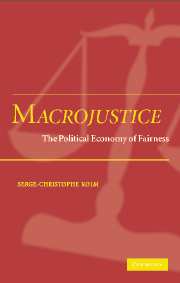Book contents
- Frontmatter
- Contents
- Presentation
- PART ONE BASES: CONSENSUS, FREEDOMS, AND CAPACITIES
- PART TWO OVERALL DISTRIBUTIVE JUSTICE: ELIE (EQUAL LABOUR INCOME EQUALIZATION)
- PART THREE COMPARISONS WITH POLICIES AND PHILOSOPHIES
- PART FOUR THE DEGREE OF COMMUNITY, EQUALITY, RECIPROCITY, AND SOLIDARITY
- PART FIVE COMPARISON WITH ECONOMICS' SOCIAL ETHICS
- 22 Related economic values
- 23 The structure and substance of distributive principles
- 24 Freedom and happiness
- 25 Freedoms, responsibility, desert, merit, equality of opportunity, capacities, capabilities, basic needs
- 26 The theory of equivalence
- 27 Conclusion
- References and bibliography
- Index
22 - Related economic values
Published online by Cambridge University Press: 31 July 2009
- Frontmatter
- Contents
- Presentation
- PART ONE BASES: CONSENSUS, FREEDOMS, AND CAPACITIES
- PART TWO OVERALL DISTRIBUTIVE JUSTICE: ELIE (EQUAL LABOUR INCOME EQUALIZATION)
- PART THREE COMPARISONS WITH POLICIES AND PHILOSOPHIES
- PART FOUR THE DEGREE OF COMMUNITY, EQUALITY, RECIPROCITY, AND SOLIDARITY
- PART FIVE COMPARISON WITH ECONOMICS' SOCIAL ETHICS
- 22 Related economic values
- 23 The structure and substance of distributive principles
- 24 Freedom and happiness
- 25 Freedoms, responsibility, desert, merit, equality of opportunity, capacities, capabilities, basic needs
- 26 The theory of equivalence
- 27 Conclusion
- References and bibliography
- Index
Summary
MACROJUSTICE AND MORAL ECONOMICS
The fifth and last part of this study compares the obtained result with normative principles that have been or can be proposed in the framework of economics. These principles are either aspects or cases of the obtained result (e.g., market liberalism, self-ownership, income egalitarianisms, social maximand functions), complements to it (for applications in the fields of microjustice or “mesojustice”), or, possibly, alternative proposals. Hence, the scope of the considered ideas is extensive. The focus here, however, is on their meaning, rather than on technicalities whose relevance fully depends on this meaning in the first place. The resulting survey of meanings of normative economic ideas, principles, or criteria probably has an interest in itself. There is, for instance, a close consideration of the various aspects of freedom (social, defined by a priori domains of choice, “natural” as socially unruly, or as various concepts and types of opportunity, rights, desert or merit from action, or responsibility); of the various meanings, uses, and properties of the concept of “utility” (happiness, satisfaction, lower pain, preference, choice, transitivity, comparabilities of various types); and of the rationally necessary structures of distributive principles (permutability, prima facie or ideal equality, lower inequality, benevolence), with their scope of application. Indeed, each principle or criterion should be accompanied by a clear and justified statement of the assumed meaning of the concepts it uses and of their properties, and of the proposed scope of application.
- Type
- Chapter
- Information
- MacrojusticeThe Political Economy of Fairness, pp. 363 - 388Publisher: Cambridge University PressPrint publication year: 2004



